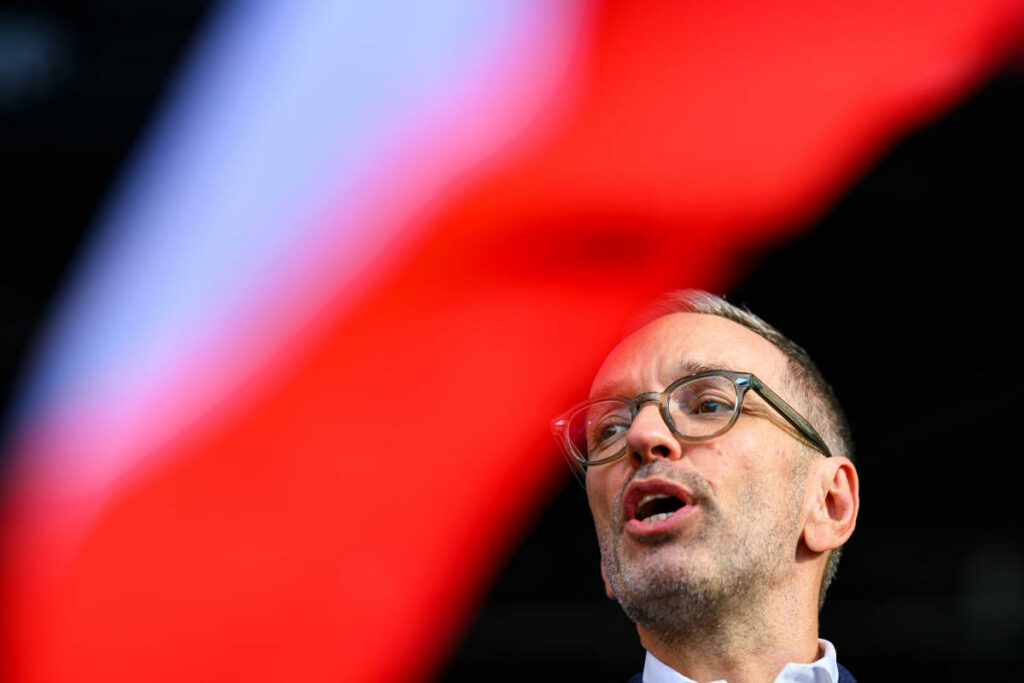The chairman and top candidate of the Freedom Party of Austria Herbert Kickl waves to supporters after kicking off his party’s electoral campaign on September 7, 2024 in Graz, Austria.
Kickl has capitalized on Europe’s migration crisis, in which hundreds of thousands of people have fled war, poverty and natural disasters in the Middle East, North Africa and beyond. Immigrants have become a lightning rod for frustrations supercharged by a continent-wide inflation and cost-of-living crisis.
Kickl’s vision is to build “Fortress Austria” and “Fortress Europe,” as he put it during a debate on Austrian public television Thursday night.
That would involve a dramatic overhaul of Austria’s immigration system, registering all new arrivals and detaining them in specialist facilities. The party is also proposing to introduce “remigration” of “unwanted strangers” — deporting migrants to their country of origin.
It’s all in the service of returning the “cultural identity and social peace of our homeland,” the FPÖ’s manifesto says, calling for Austria to be a place of “homogeneity” rather than “diversity.” During Thursday’s debate, Kickl portrayed immigration as “a gigantic security issue, because we’re bringing Islamisation into the country.”
This has all caused widespread horror across the political spectrum, with opponents calling these policies xenophobic, racist and Islamophobic. Jewish commentators also accuse the party of using antisemitic tropes, with an opinion piece in the Jerusalem Post on Thursday labeling Kickl a “neo-Nazi” who “performs acrobatic feats” to dodge Austria’s strict laws against antisemitism.
Austria’s incumbent leader, Karl Nehammer, of the rival conservative Austrian People’s Party, has called Kickl a “right-wing extremist.” And Andreas Babler, leader of the left-wing Social Democratic Party, told Kickl during a TV debate last week that “I think you are extremely dangerous.”
Austrian Chancellor Karl Nehammer and chairman of the Freedom Party of Austria Herbert Kickl meet during a televized debate in Vienna, Austria on September 23, 2024.
The FPÖ did not respond to NBC News’ request for an interview or comment in response to these criticisms.
For Gabriela Bacher, an Austrian-American film producer and political campaigner, there are latent parallels between her homeland and former American President Donald Trump.
“After four years of Trump and MAGAism,” she told NBC News, “I came back here and realized it’s actually no better. It’s the same right-wing, populist attempt of trying to rattle people with fear mongering and hate and hate speech.”
She sees the FPÖ as wanting nothing less than “a restructuring of the Austrian Republic,” and using “very fascist language” reminiscent of the “1920s and 30s” — when the Nazis rose to power.
Others worry the FPÖ’s influence could extend far beyond its own borders.
It has for years been sympathetic toward Russia, not just calling for an end to Europe’s support for Ukraine but also advocating an end to the sanctions placed on Russia over its war. In 2016, party leader Heinz-Christian Strache signed a formal “cooperation pact” with Putin’s United Russia party. And a year later its appointed foreign minister, Karin Kneissl, danced with Putin at her wedding.
It has been a junior coalition partner before, but crashed out in 2019 after Strache was secretly recorded offering to fix government contracts with a woman posing as the relative of a Russian oligarch.
A year earlier, NBC News went to the Austrian capital Vienna and spoke with security experts who were alarmed at the party’s Putin ties. These analysts openly worried that the FPÖ’s presence in a E.U. government could see Western secrets leaked to Moscow.
This time, an FPÖ-led Austria could form a Ukraine-skeptical bloc with like minded neighbors, Slovakia and Hungary, the latter led by Trump ally Victor Orban, who proudly calls his nation an “illiberal democracy.” Its election would be the latest chapter in a rightward lurch across Europe, with voters rejecting mainstream centrists not just over immigration and the economy, but the environment and so-called “culture war” issues, too.
The FPÖ’s return is far from certain, currently polling at 27%, narrowly ahead of the ruling Austrian People’s Party on 25% and the Social Democratic Party of Austria on 21%, according to European polling aggregator PolitPro. A coalition is almost certain — not an easy task when the FPÖ is so vilified by opponents.
Bacher, the film producer, is part of an organization called “A Promise for the Republic,” which is trying to make that even harder, petitioning Austrian politicians to rule out collaborating.
“This is really the republic that is at stake here,” she said.
Source link : http://www.bing.com/news/apiclick.aspx?ref=FexRss&aid=&tid=66f81c1a7aa247aab0512d775314cb82&url=https%3A%2F%2Fwww.aol.com%2Fnews%2Ffar-party-nazi-roots-brink-141241885.html&c=18152568567137121792&mkt=de-de
Author :
Publish date : 2024-09-28 07:12:00
Copyright for syndicated content belongs to the linked Source.
